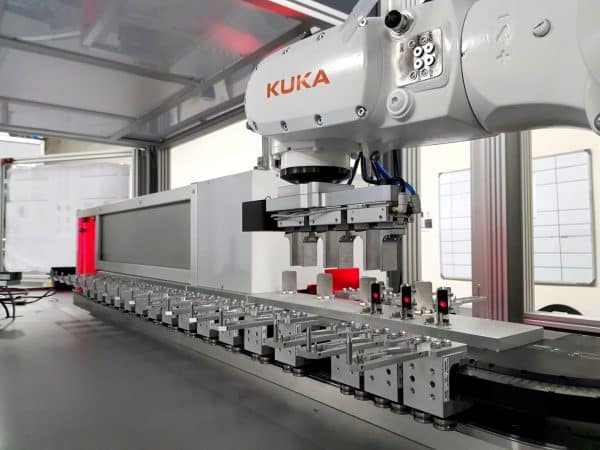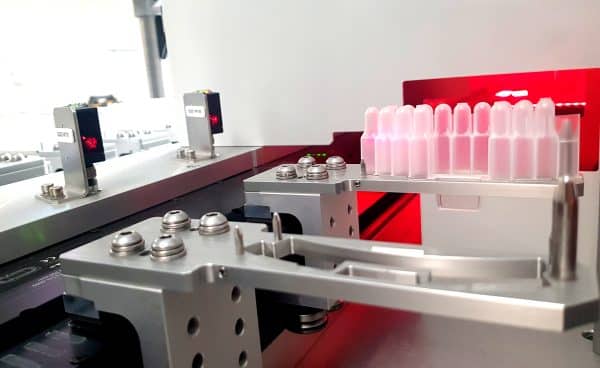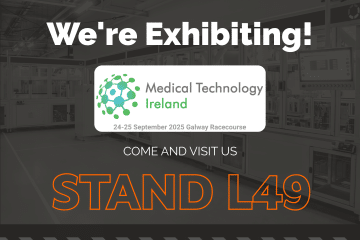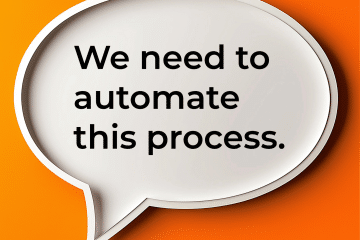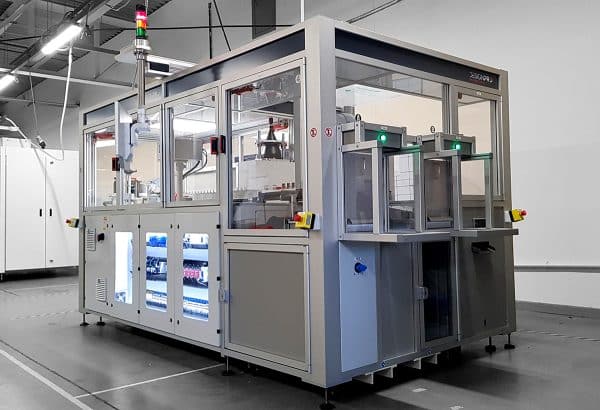
Enhancing Medical Device Production through Automated Inspection and Packaging Solutions
INDUSTRY: Medical Device
CLIENT: A Global Leader In Plastic Injection Molding
Overview
DesignPro was approached by a leading Medical Device company specialising in plastic moulded dilution trays for the diagnostic sector. They required a system that was capable of inspecting, labeling, and preparing these trays for packaging at a rate of one tray every 1.5 seconds.
Our task was to ensure that the solution matched the reliability and efficiency of the moulding process, which produced 40 trays per minute, while also accommodating the warmup and downtime timings of the moulding machines.
The customer gave us the freedom to innovate beyond the confines of the moulding machine, including its integrated Yushin robot which handled the freshly moulded components, and design a system that would efficiently streamline the transfer process of these parts.
Customer End Goal
To produce a perfectly moulded part that was validated, inspected, labelled and stacked ready for packaging to meet their customers volume expectations. Delivered in 42 weeks start to finish.
Customer Pain Points
Moulding processes inevitably involve defect, which traditionally require manual inspection. Operators must individually examine each part for flaws originating from the moulding machine, necessitating the employment of over eight workers to keep up with production. This manual inspection is costly for a company operating an eight-hour shift, due to the high reject rate, scrappage, and the effort needed to separate rejects. DesignPro proposed integrating a vision system to eliminate human error during inspection. This system would clearly distinguish between pass and fail, validate the parts for the customer, and prepare them for packaging.
- Moulding Process Productivity
Outputting 8 parts every second would require a significant amount of manual labour over an 8-hour shift. Staff are required to manually inspect each individual part that is produced for defects, separate rejects and sort scrappage. This would require a large number of employees resulting in increased labour costs. - Accuracy of Inspection
With every moulding process there will be defects. The customer needed to eliminate human error and speed up the process of defining a pass or fail so the part can be accurately validated and presented for packaging. - Efficiency of Output
The process needed an efficient way to present the product in volume so it could be easily packaged. - Decrease Reject Rate
When separating the reject parts it was important for the customer to have clear visibility of the type of defect that was being detected so that they could pin point the issue and modify the moulding process. - Traceability
Integration of a labelling solution that could be integrated into the inspection process.
How Did DesignPro Approach The Project?
The journey of developing an automated system for inspecting and packaging plastic dilution trays for a leading medical device company was a detailed and collaborative process. It began with a proof of concept phase where the DesignPro team conducted thorough product reviews, designed, manufactured, assembled, and rigorously tested prototypes.
Once the concept was proven feasible, the project moved into the design phase, collaboration with the client was key to finalising specifications and design elements. This involved numerous meetings, reviews, and approvals to ensure alignment with the client’s needs and industry standards. With the design finalised, the team prepared a full suite of technical documentation; functional design spec, software design spec, DFMEA giving the customer confidence that the system was de-risked and ready for manufacture.
As assembly commenced, each station was carefully constructed, tested, and integrated into the system. Simultaneously, the controls, electrical, and PLC teams wired, programmed, and commissioned Beckhoff’s advanced XTS transfer system technology.
Robotics and vision systems were designed, simulated, programmed, and fine-tuned to ensure seamless integration with the overall system. As the project neared completion, thorough debugging and testing ensured all components functioned flawlessly.
Finally, the installation team prepared for deployment, meticulously packing equipment, traveling to the client’s site, and overseeing the installation process. Post-installation support and feedback loops ensured any issues were promptly addressed, culminating in the successful implementation of a cutting-edge solution that transformed the client’s production process.
What Was The Outcome For The Customer?
Higher quality product
Customer has a fully validated moulded part from the source of where they inputted the material into the moulding machine. Part is ready to go to their end customer inspected, validated, and labelled for traceability.
Future proofed solution
By integrating intelligent Beckhoff technology into the machine design this solution can easily adapt its speed to suit any changes in future production requirements.
Do you have an automation project you’d like advice on?

